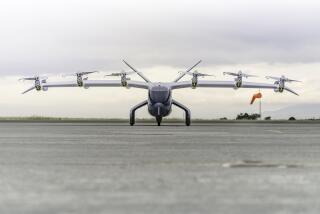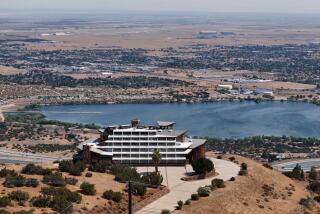Palmdale Airport Boosters Seek a Way to Lure Airlines
- Share via
If Palmdale Regional Airport is ever going to take off, the community needs to use it, according to supporters who are searching for ways to lure more airlines to the airport.
Owned by the city of Los Angeles, the airport has struggled over the years as a series of mostly small airlines have come and gone after typically short stays. In the mid- to late-1980s, the terminal even went unused.
At a gathering Wednesday of the airport’s booster club--the Palmdale Regional Airport Advisory Council--members agreed that the airport is an important part of the Antelope Valley’s vital transportation network.
The problem, however, is convincing airlines.
“We have to do something,” said airport supporter Paul Heindel. “We’re the key.”
Determining that something is what airport supporters are grappling with.
Heindel said that part of the problem is that airline carriers still perceive the Antelope Valley as a remote, sparsely populated area and are slow to make themselves available to even talk about servicing the Palmdale airport.
Just one carrier is operating out of the lone terminal at Palmdale Regional Airport. New Mexico-based Mesa Airlines, operating at the airport as United Express, was left as the sole carrier March 1, when SkyWest Airlines discontinued service after nearly four years in Palmdale.
Brandon Eaton, Mesa’s station manager in Palmdale, said the airline is doing well, particularly since SkyWest pulled out.
But Mesa’s offerings are limited, with flights available only between Palmdale and Los Angeles International Airport, where a connecting flight to other destinations may be caught.
The cities of Lancaster and Palmdale agree that the airport is an important component of the region’s transportation network. The question of air service invariably is raised by companies considering relocating to the Antelope Valley.
“If you don’t have transportation connections, you have limited opportunity for economic growth,” said Steve Dukett, Lancaster’s redevelopment director.
The city of Los Angeles in the late 1960s purchased nearly 18,000 acres of desert in Palmdale for what the Department of Airports envisioned as an intercontinental airport.
More to Read
Inside the business of entertainment
The Wide Shot brings you news, analysis and insights on everything from streaming wars to production — and what it all means for the future.
You may occasionally receive promotional content from the Los Angeles Times.










